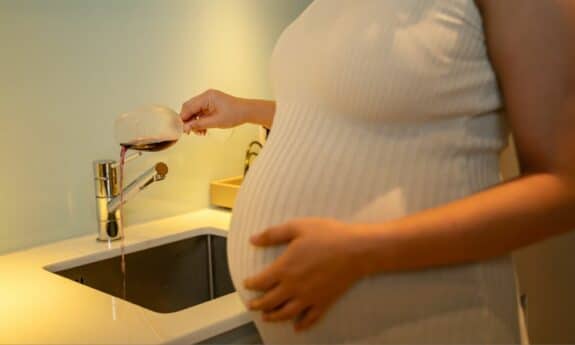A recent survey has revealed that a concerning number of Australian women lack knowledge about the risks of consuming alcohol during pregnancy. Shockingly, one in three women are unaware of how alcohol can harm an unborn baby, and roughly the same number plan to continue drinking throughout their next pregnancy.
Health experts have described these findings as “frightening,” emphasizing the serious and long-term physical and mental damage that alcohol can inflict on a child in the womb. In response, there are calls for new national guidelines to be introduced this year.
The unpublished study, which surveyed 1,103 Australian women, found that over a third of participants were unfamiliar with the adverse effects of alcohol on a fetus. Alarmingly, a significant number of women were willing to consume alcohol during the most vulnerable stage of pregnancy, the first trimester.
Dr. Elizabeth Peadon, the lead researcher from the Australian Paediatric Surveillance Unit, highlighted the need for ongoing education on the topic. While the majority of women in the survey were aware of the risks, a significant percentage were uninformed and unconcerned.
Currently, Australian guidelines recommend no more than two standard drinks a day and a maximum of seven drinks per week for pregnant women. However, both the United States and the United Kingdom advise complete abstinence.
Professor Elizabeth Elliott, a renowned paediatrician from the University of Sydney, expressed concerns about the new findings and suggested that the “no alcohol” message may be the safest approach. As there is no established safe level of alcohol consumption during pregnancy, avoiding it altogether is currently the best option.
The detrimental effects of alcohol during pregnancy are extensive and can lead to stillbirth, prematurity, low birth-weight, and even miscarriage. Babies affected by alcohol exposure can develop birth defects, neurodevelopmental issues, and, in severe cases, fetal alcohol syndrome, which presents a range of physical and mental problems.
During her presentation, Professor Elliott shared new research revealing that Australia recorded 92 cases of fetal alcohol syndrome between 2001 and 2004, with 64% occurring in indigenous families. Alarmingly, in half of the cases, another sibling in the family was also affected.
The condition often goes undiagnosed until a child is as old as 12, making intervention less effective. Professor Elliott believes that under-reporting occurs due to a lack of knowledge among healthcare professionals, stigma surrounding the issue, and limited access to diagnostic services.
These findings highlight the urgent need for increased awareness and education regarding the dangers of alcohol consumption during pregnancy. By spreading this crucial information, we can protect the health and well-being of future generations.
The UK just recently joined U.S., Canada, Australia, New Zealand and France, asking pregnant women not to drink while pregnant.
{CSTOCK}







